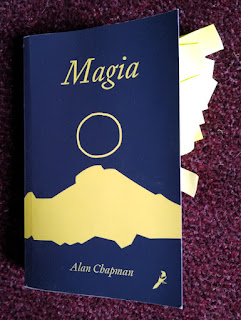Review - Acid Drops, by Andy Roberts
https://psychedelicpress.co.uk/products/acid-drops-by-andy-roberts
I opened this book to a promising start - a Chaos Sigil, wound with ergotized cereal stalks... This is a clue to what is to follow.
The narrative plunges rapidly into Andy's first acid trip - a quite spectacularly 'bad' one. This is another clue - to Roberts's honesty. He is not trying to paint a pastel-rosy illusion of psychedelia but is interested in the whole thing, warts and all. Later in the book, he debunks a few popular misconceptions which have become 'acid myths' - such as Francis Crick being on LSD when he conceived the structure of DNA, the idea that anyone seriously considered putting acid in water supplies and the peculiar role of the chemical hydrazine hydrate in the Operation Julie acid raids.
Early in the text we have a well-informed overview of the illegalization of psychedelics, complete with a confession from a major War on Some Drugs player that the information distributed by the government was lies (nothing new there then, but it's good to have it clarified sometimes), and a snapshot of the surreal attitude of the government in sacking David Nutt, the man who told the truth about how harmful various drugs are, and lost his job because the truth 'sent the wrong message'.
From the start, Roberts outlines some important requirements for a successful trip, including quoting me from an old interview, about the power of intention.
There are some historical reflections for context, but the history of psychedelia, at least in UK, was covered very well in the author's 'Albion Dreaming'; this is quite a different book, more personal, diving down into details in interviews with major figures from psychedelia - acid chemist Casey Hardison, Liz Elliot (former partner of Bran Barritt and friend/lover of Timothy Leary) and even an exchange of emails with Augustus Oswley in his final years.
Other essays in this kaleidoscopic offering include some background to Alan Ginsberg's poem about an LSD trip in Wales and thoughts about the Grateful Dead's mass telepathy experiment.
Speaking of the Dead, Roberts does not flinch from revealing what went on behind the curtains of Middle England during the acid days of his youth. I have occasionally wondered why the main activity - listening to records - was not mentioned in other accounts. That's mainly what my friends and I did back in those late 60s-early 70s days - listened to the latest offering from the great psychedelic bands. Roberts and I concur on favourite groups - I too thought the Dead and the Incredible String Band were the performers of choice for
deep inner voyages, together (in my case) with Jefferson Airplane, Love and the mighty and oft-neglected Spirit.
There are also account of influential events in British psychedelia - the original 1971 Glastonbury and the Welsh Mushroom Fairs.
Last but not least Roberts considers the magical worldview, with his extraordinary story of the plastic ducks. No spoilers, read the book! Synchronicity abounds when you take acid and go out walking... As to what you do with the events that happen, that can take up the rest of your life.
Magic encircles the book, from the comments in the Introduction to Julian Vayne's epilogue. Each chapter ends with the same ergot-entangled chaos star; this is not to say that Roberts is slipping an occult viewpoint in under the radar, but I think it is fait to say that his comments in the Introduction about Chaos Magic show that he regards its multi-model agnosticism as the most useful conceptual framework for dealing with the slippery, layered realities of the psychedelic gnosis. And if Mr Roberts is not saying that, then I am.
This is a superb book, very well written and, if you are at all interested in these issues, unputdownable.



Thanks Dave, you've nailed exactly what I was trying to get across!
ReplyDeleteGood stuff!
ReplyDeleteThis comment has been removed by a blog administrator.
ReplyDeleteThis comment has been removed by a blog administrator.
ReplyDeleteThis comment has been removed by the author.
ReplyDelete